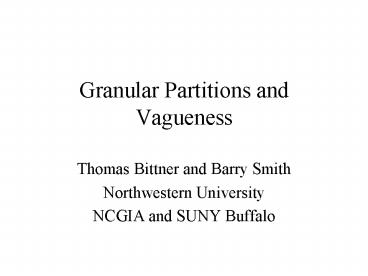Granular Partitions and Vagueness PowerPoint PPT Presentation
1 / 21
Title: Granular Partitions and Vagueness
1
Granular Partitions and Vagueness
- Thomas Bittner and Barry Smith
- Northwestern University
- NCGIA and SUNY Buffalo
2
Overview
- Introduction
- Context, granular partitions, and vagueness
- Boundaries and contexts
- Conclusions
3
Three people and a mountain
J We will cross the boundary of Mount
Everest within the next hour
wants to determine the truth of J in a
context-free fashion
wants to determine the truth of J in a
context-dependent fashion using granular
partitions
4
Vagueness
Where is the boundary of Everest?
This boundary is subject to vagueness
Vague objects and boundaries as ontological
primitives
Extend semantics supervaluation
5
Supervaluation (Fine 1975)
- Extension of reference semantics to vagueness
- Takes multiplicity of candidate referents of
vague names into account
- S X is a part of Mount Everest
- Truth value of S is determined for all candidate
referents of Mount Everest
- S is supertrue if it is true for all candidates
- S is superfalse if it is true for no candidate
- S is indeterminate otherwise
6
!
Truth value indeterminacy does NOT occur if we
analyze sentences with vague names (like
Everest) in a context-dependent fashion !
7
Context, granular partitions,and vagueness
8
Theory of granular partitions
Major assumptions
- There is a projective relation between cognitive
subjects and reality
- The grid is usually not regular and raster
shaped
9
Projection of cells
Projection
10
Features of granular partitions
- Selectivity
- Only a few features are in the foreground of
attention
- Granularity
- Recognizing a whole without recognizing all of
its parts
11
Projection establishes fiat boundaries
Part of the surface of the Earth photographed
from space
Cell structure
- no counties
- no county boundaries
12
Crisp and vague projection
Montana
crisp
vague
Every projection singles out one admissible
candidate of reference
13
Vague judgments about mereological structure
X is part of Y, X is a vague name
J (X is part of Y, PtV)
14
Vague judgments about mereological structure
J (X is part of Y, PtV) supertrue
15
Boundaries, contexts, and truth-value
indeterminacy
16
Boundaries and contexts
- We distinguish
- contexts in which our use of a vague term brings
- a single crisp fiat boundary
- a multiplicity of crisp fiat boundaries
- into existence
17
The single crisp boundary case
J (This is the boundary of Mount Everest, Pt)
- The judging subject must have the authority
- (the partitioning power) to impose this
boundary
e.g., because she is a member of some government
agency
Vagueness is resolved. J has a determinate truth
value
18
The multiple boundary case
Vague projection brings a multitude of boundary
candidates into existence
Truth-value indeterminacy can potentially arise
To show naturally occurring contexts are such
that truth-value indeterminacy does not arise.
19
The multiple boundary case
Claim
The judgment can be uttered only in contexts
(1) Where it is precise enough to be (super)true
(2) but not precise enough for indeterminacy to
arise
20
The multiple boundary case
The subject (restaurant owner) judges J (The
boundary of the smoking zone goes here,
Pt) while vaguely pointing across the room.
Context 1 To advise the staff where to put the
ashtrays
Context 2 To describe where nicotine molecules
are
The projection must be just precise enough to
determine on which table to put an ashtray
truth-value indeterminacy can potentially occur
But nobody can seriously utter such a judgment
in naturally occurring contexts
No truth-value indeterminacy
21
Conclusions
- Theory of granular partitions provides a tool to
understand granularity, vagueness, and the
relationships between them
- Context is critical when analyzing truth-values
of judgments
- In naturally occurring contexts truth-value
indeterminacy does not occur
- Formalism see paper
- Partition-theoretic solution to the Sorites
paradoxes see paper

